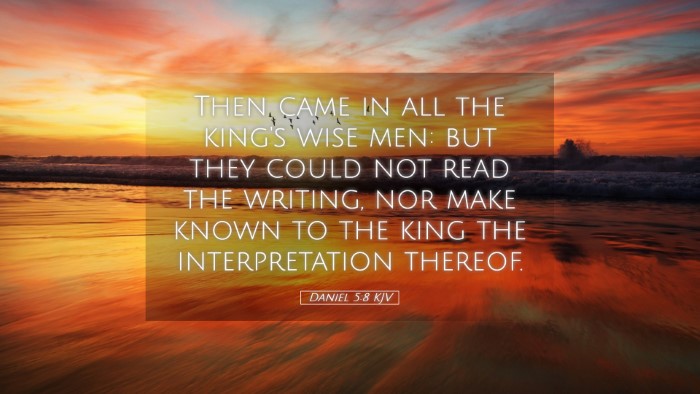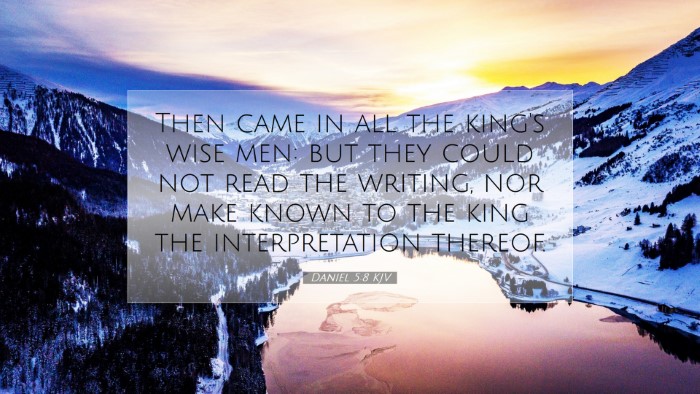Commentary on Daniel 5:8
Daniel 5:8 presents a critical moment in the narrative of Babylonian history and the prophetic unfolding of God's judgment. The verse states:
“Then came in all the king’s wise men: but they could not read the writing, nor make known to the king the interpretation thereof.”
Context of the Verse
This verse occurs during the reign of King Belshazzar, who holds a feast using the sacred vessels taken from the temple in Jerusalem. During this event, a mysterious handwriting appears on the wall, prompting panic among the revelers.
Insights from Commentaries
Several renowned commentators provide insights into the implications of this verse:
Matthew Henry's Commentary
Matthew Henry emphasizes the foolishness and helplessness of the wise men when confronted with divine mysteries. He notes that:
- The inability of the wise men reflects the limitations of human wisdom when it is faced with divine revelation.
- This incident serves as a turning point, illustrating that God does not reveal His secrets to those who are unworthy or unprepared to understand them.
- Henry also observes how the failure of the wise men signifies God's sovereign control over interpretation, showing that true wisdom and understanding come from Him alone.
Albert Barnes' Notes on the Bible
Albert Barnes provides a detailed analysis of the circumstances surrounding Belshazzar’s feast and the ensuing events:
- He underscores the significance of the wise men’s failure, arguing that it highlights the contrast between earthly wisdom and the wisdom that comes from God.
- Barnes also points out the desperation of Belshazzar, as he turns to the wise men who had always failed to provide real insight into celestial matters.
- He draws attention to the primary lesson that human understanding is insufficient when it comes to the matters of divine judgment.
Adam Clarke's Commentary
Adam Clarke reflects on the theological dimensions of the events in this verse:
- Clarke posits that the wise men symbolize the broader human condition, highlighting a reliance on one’s own understanding rather than seeking divine revelation.
- He notes the futility of human efforts in deciphering what is inherently spiritual, suggesting that only God provides the wisdom necessary to interpret His dealings.
- Clarke also asserts the prophetic nature of this moment, as it foreshadows the impending doom due to Belshazzar’s sacrilegious actions.
Theological Reflections
The events surrounding Daniel 5:8 lead to profound theological reflections that can guide pastors, students, and theologians:
- The Dependence on Divine Wisdom: The text underscores the necessity of divine assistance in understanding spiritual truths. Human wisdom, irrespective of its perceived depth, falls short in moments requiring deep spiritual insight.
- Judgment and Accountability: Belshazzar’s actions and the subsequent lack of understanding signify the accountability that comes with knowledge. Ignoring divine authority leads to grave consequences, something that resonates through biblical history.
- The Role of the Prophet: The chapter transitions the narrative to Daniel, who will provide understanding. This introduces a discourse on the purpose of prophetic voices and their essential role in revealing God’s plans to humanity.
Conclusion
As pastors and scholars reflect on Daniel 5:8, they must consider its broader implications within biblical teaching. The verse challenges one to reassess where one places their trust – in the wisdom of man or the wisdom of God. Human efforts without divine insight are ultimately void, a lesson vividly illustrated in this poignant moment of scripture.


